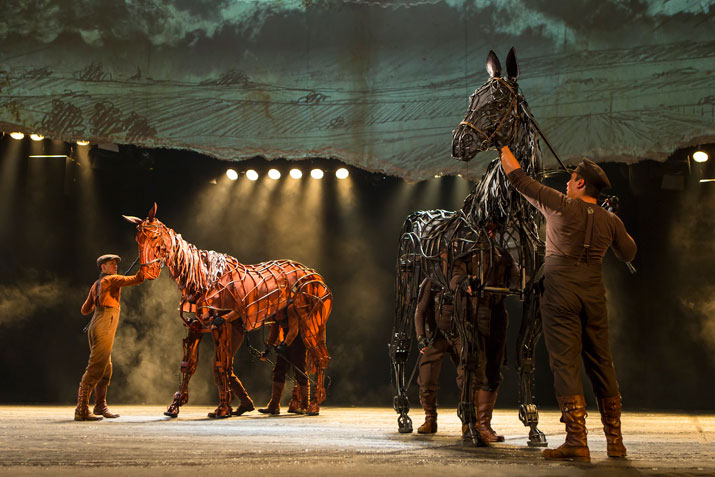
Courtesy photo
It is easy to see how the story of War Horse has charmed audiences for decades, from readers of the 1982 children’s novel on which the play is based, to fans of Steven Spielberg’s more recent cinematic version. The magic of the play takes the cake, though.
The story of an English lad who grows up with a horse his father eventually sells for the 1914 war effort will touch your heart. When the curtain rises after intermission we are taken into darker recesses of love and violence on the war-torn plains of the Western Front. Designed by the Handspring Puppet Company of Cape Town, South Africa, the eponymous warhorse, Joey, is a wonder of the stage. There is seemingly nothing the company cannot bring to life through their puppets, from war machines to indignant geese.
Many audience members will feel more for this clever representation of a horse than they have for any human character from earlier in the Broadway series this season. Three men wield the frame of the full-grown horse, one for the head and two for the body and legs. The ears twitch and the tail swishes synchronously, with all the rhythms of its nervous, breathing real-life counterpart. The audience is ultimately enraptured with the fate of the horses every bit as much as their riders, if not more so.
Awe for the technical mastery of the puppets and their puppeteers doesn’t distract for long, though. As Joey comes to life and into the life of his young master, Albert Narracott, played by Alex Morf, we are absorbed with their joined fates. But the emotional connection comes with the risk of strain and loss. Potential that is mined to its limits by the play’s creative team, including adaption for the stage by Nick Stafford and puppet choreography by Toby Sedgwick. The talent behind the work is self-evident.
War Horse garnered five of the 2011 Tony awards, including the coveted award for best play. Before its success in the US, the play’s opening in London won the Olivier and London Critic’s Circle Theatre Award after a stretch of performances on the West End. Though it is a play, not a musical per se, the emotional subtext is girded throughout by song. A narrator-like character called Song Man (performed beautifully by John Milosich) embodies the characters’ emotional journeys in pastoral-like lays. In one especially moving scene a chorus of three women kneel and sing behind the bodies of the fallen. The play is felt visually and musically as much as by any of the dialogue-driven action.
Throughout the play the scenes are set with projections, often in gorgeously animated pencil drawings. Framing the stage, one wide, white gash of a screen hangs horizontally across it. The spare set design serves wonderfully and is one of the finest touches. In one moment, a full moon of misting spotlight shows above the screen, every bit as haunting as the real thing. And despite all of these tricks, almost nothing distracts from the spell being spun.
While there were no real standout performances among the actors (except for Joey, of course), there were no noticeably weak links, either. Overall the touring cast is solid, though generally overshadowed by their surroundings and the eye-catching puppetry. Handspring’s work is really the star here.
From the beginning of the play we understand that the inevitability of tragedy goes hand in hand with war and yet we hope against hope that they may survive. The theme of rivalry and male competition is threaded throughout, from Albert’s father, who purchases Joey as a foal with the mortgage money for his farm in order to one-up his hoity-toity brother, to the Englishmen and Germans at odds in the midst of WWI. Another poignant scene reveals an English contingent in a foxhole face-off with a German one across the barren no-man’s land. When they realize our horse has crossed the field and is snagged by the wire, each waves the white flag and sends a man to release it. They meet at the horse’s side in a brief moment of truce, even acknowledging once the horse is freed, his fate decided by a coin toss, how the war would not be necessary if men could come together for nobler causes. By being emotive rather than politically overt, War Horse accomplishes much and accesses so much more.
Despite the play’s obvious draw for families and children, the theme of war is sharp. Men and horses are shot on stage. Barbed wire snares them and deep trenches are dug to no avail. The entire second half takes place in the black latter years of World War I. Though caution is recommended in allowing younger audience members to attend, the educational value of the play is of a greater caliber than most mainstream fare. A play for the mature and parentally guided, this is a weeper hit that dares you to leave the auditorium with dry eyes.
War Horse avoids the tedium to which so many war plays before it have succumbed. Albert’s heroic soldiering in search for his equine friend is sentimental, but effective. We follow their journey like we do any good love story, grasping at the possibility that life could yield something beautiful as reward for the struggle of living it.
The play runs through its 2 p.m. matinee on Sunday. Tickets can be purchased at waltonartscenter.org, or by calling 479-443-5600.

